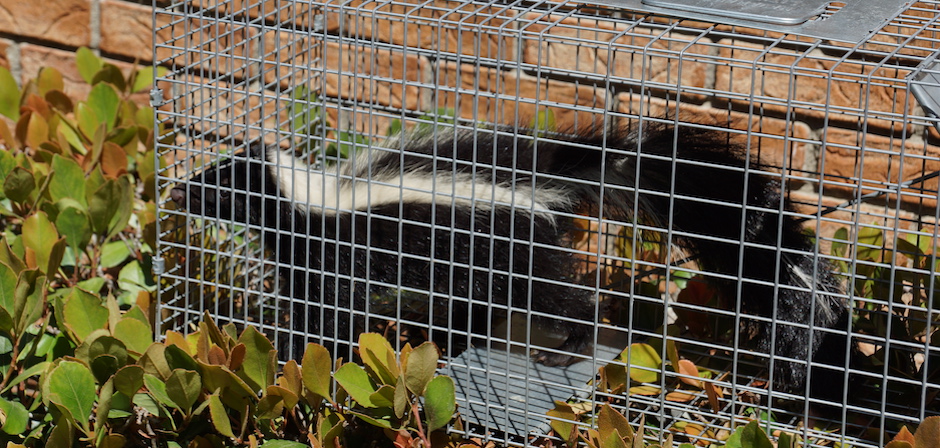Skunk exterminator
Skunk exterminator
Skunks enter into your lawn in search of their food, which is insects. They can also eat small animals. They occasionally visit gardens, and if they do, it may be because corn or other plants are close to the ground.
The skunk claims homesteading rights from coast to coast. Distributed across the country are four species of skunks, including the striped skunk (Mephitis mephitis) and the spotted skunk (Spilogale putorius). The common striped skunk lives mostly in sparse forests and fields.
Skunks can be very nice to have around because they dig up and feed on the larvae of cutworms, Japanese beetles, hornworms, and other crop-destroying insect life. However, skunks are not only partial to insects; they will eat leaves, buds, grasses, grains, garbage, any fruit or berries within reach, and even small game. They also may disturb your plants while digging for these grubs. This is what can make them a bit of a nuisance to gardeners.
Skunks are well known for their spray, and the smell of spray can be smelled from a mile. Furthermore, a skunk can “shoot” you from 10 to 12 feet, sideways, up, or down, with little apparent effort. Most gardeners worry more about a skunk spraying in the garden, on the gardener, or on a pet than about a skunk chewing up some veggies.

Skunks damages
Skunks dig holes while searching for grubs. They can destroy your lawn by digging holes all over in it; skunks also eat corn if you have corn plants in your garden, they are going to damage these plants. The smell of Skunks spray is another issue.
How to get rid of skunks
Mix the castor oil with dishwashing detergent and spray this mixture in the garden, they don’t like this smell. You should spray this mixture at night.
Eyes of skunks are very sensitive to bright lights. A bright light or a motion sensor flood light will scare skunks away.
Skunks hate the smell and taste citrus fruits, place oranges or lemon in your garden it will repel the skunks.
·- Many readers have found success in placing ammonia-soaked rags around the yard; however, these need to be replaced often.
- If the skunks are in a smaller garden patch, put bars of strong-smelling soap or a room deodorizer near your garden. Ironically, skunks hate strong scents.
- If nothing works, there are humane ways for professionals to trap raccoons and skunks and transport them elsewhere. Often, skunk removal by trapping is the only answer, and they're just isn’t a lot you can do if it is a skunk. However, be aware that many species of wildlife do not survive when placed in a new territory, and it may not even be legal to trap and relocate wild animals in your area.
- If your garden is located in a small space, then you can also use fencing as an option.
- Seal all the nearby areas by using chicken wires; these wires will keep skunks away from your garden.
Visit our Wildlife Trapper Bolingbrook home page to learn more about us.

